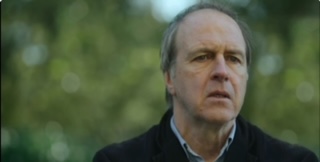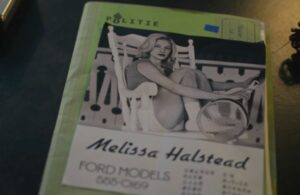Justice – Episode 4 begins with Delia Balmer (Anna Maxwell Martin) recounting for the court the night she was attacked by John Patrick Sweeney (Shaun Evans). Although it’s been 7 years and Delia speaks rapidly, she appears to remember everything down to the slightest detail. Before the opposition begins their questioning, Delia provides a brief update on how the attack has impacted her life. It doesn’t take Delia long to become flustered when the opposing council takes over to shine light on her relationship with Sweeney. The mention of her refusal to accept police protection only makes matters worse.
In comparison, Sweeney remains fairly composed during his testimony and relies on Delia’s grudge against him to explain her accusations. As for Joshua Wilson’s (Jack Franklin) eyewitness account, he chalks that up to a simple misidentification. Although he takes immediate responsibility for the artwork, it isn’t until they are introduced that he becomes slightly agitated.
It’s not long before the Judge (Gerald Tyler) discusses the verdict process with the jurors. After 9 hours and 40 minutes of deliberation, they come back with a unanimous decision of guilty. Sweeney doesn’t react very well to the announcement.
Despite the successful verdict, Delia’s life unravels when the local paper releases an article with Sweeney’s drawings. She appears to be scared that people are laughing at her and David’s (Kevin Doyle) assurances that this isn’t the case only put her at further unease. Things only worsen when a visit from DC Christine Webb (Laura Morgan) reveals that Sweeney will be eligible for parole after serving only 9 years.
Outraged with the discovery, Delia takes on a campaign to prevent the courts and police from mistreating other victims. She starts with a letter to Police Commissioner, John Stevens, but that doesn’t go at all as she intended. Although she receives a response to the letter, it only makes her feel worse because John didn’t respond personally. She continues her pursuit and David continues drinking. He does attempt to coax her out of the house but her excuse is they need to be more frugal with their spending.
Despite her hesitation, Delia does invite David out one evening, but this too turns into a spectacle when he brings up her testimony about never loving anyone and knowing her before Sweeney. The further the discussion goes, the more outraged they both become. Delia’s night only gets worse when she storms out of the restaurant and attracts the attention of a nearby group of policemen. After a bit of confusion and heated arguing, she ends up spending the night on a drunken disorderly.
Delia is released with an apology the following morning after CS Arnold Pearce (Mark Flitton) recognizes her from the trial. Although he offers a police escort home, she refuses. Upon returning home, Delia is besieged by a frantic David before she even gets through the door. This is the couple’s final argument as she simply tells him that their relationship just isn’t working. She does appear to regret the decision once she’s alone inside.
When the story skips ahead two years in the future, it appears that Delia has shifted her focus toward work. She one day visits Sister Tessa Waller (Renu Brindle) in the HIV ward and offers her services as a therapeutic masseuse. Tessa is grateful but claims they don’t have the budget. This leads to Delia volunteering and meeting Nabil (Amrou Al-Kadhi). She immediately hits it off with him and is even back to biking.
The story shifts to Amsterdam and the detective who investigated the still unsolved murder of Pula Fields (Debbie Brannan). One day in 2009, DI Steve Smith (Geoffrey Streatfeild) receives a call from Astrid De Vries (Sallie Harmsen), with the news that her department has just successfully identified the remains of Melissa Halstead. Not only was Melissa a former acquaintance of John Sweeney but her hands, head, and feet had been removed. When Steve shares the news with his superior, DCI Howard Groves (Clarence Smith), a race to link Sweeney to the crimes ensues. By this time, Sweeney has already served 6 years and will soon be eligible for parole. Despite both women’s coincidental connections to Sweeney and their similar dismemberments, there is apparently only one thing linking him to the murder, Delia’s claim that he admitted them to her.
It doesn’t take Steve and DC Ruth Croft (Zita Sattar) long to realize that a successful prosecution hangs on Delia’s testimony. Despite this, it only takes them one meeting with Delia to realize that she has no interest in getting involved. While Steve and Howard debate alternatives to a live testimony with Jack Halstead (Mitchell Mullen), Ruth interrupts with news of a shocking discovery from the Sweeney family home. Despite the evidence, Jack maintains his belief that a successful prosecution hangs in Delia’s hands.
The chances of a guilty conviction begin to look even worse when investigators later learn that the Judge won’t introduce taped testimony as evidence, either Delia testifies live before a jury or the evidence remains unknown. Delia continues to refuse to testify which eventually leads to Steve suggesting a medical examination. This leads to Delia visiting Dr. Larence Howes (Nicholas Khan) which requires dredging up the painful memories from the night she was attacked. The session was uneventful except for Delia admitting that it was the thought of seeing her family, Stewart Balmer (Cory English) again that kept her clinging to life.
In the end, Howes grants the medical exemption, allowing the prosecutors to share Delia’s testimony with the jury. It apparently does the trick because Sweeny is not only given 2 life sentences but parole is no hope of parole this time around.
The series ends by showing Delia renewing her passport and resuming her travels. There is also a brief excerpt about her book, along with a dedication to Melissa Halstead and Paula Fields.
Until I Kill You Review
Without taking a single look at the real case, I could easily see how this could become a controversial series. To start, and this is just my opinion, 2 kills do not make a serial killer. I don’t know the technical definition, but in my opinion, one would need a much higher kill count. I would never say that any death is meaningless or attempt to downplay Delia’s experiences. At times, the series was incredibly boring, yet suspenseful enough to keep me watching.
It did pique my interest in reading the book, although I’m not rushing out to buy it. That said, I’d give the finale a 5.6 out of 10, as it was incredibly portrayed. Anna did a fantastic job as Delia and Shaun was far underutilized as Sweeney. I do feel as if so much more could have been accomplished with the series, but all in all, not horrible. My biggest complaint would be the light in which the police and courts were shown. I am sure there is more than enough incompetency to go around but I felt at times Delia was playing the victim card just a wee bit too much.
Get more Until I Kill you recaps here. Support Reel Mockery by donating. Learn how advertising with us can help build brand awareness. Join our newly established forum to discuss the latest TV shows and movies.





0 Comments Leave a comment